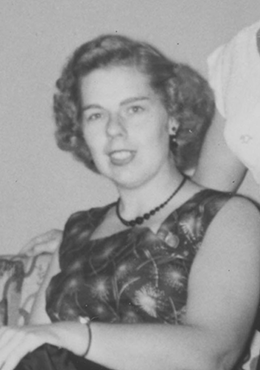1926–2021
Founding member of SWE Boston, human rights advocate

Mary Louise Pottle was among the early women graduates from Northeastern University’s department of mechanical engineering and one of the four founders of the SWE Boston Section. Graduating from Northeastern in 1948, she went to work for Allis-Chalmers as a sales engineer.
Pottle joined SWE in 1951, and was elected chairman (i.e., president) of the New England (now the Boston) Section that year. Pottle served in various leadership positions in the New England Section during the 1950s, including several times as chairman. She also served as New England Section director, meaning she represented the section on SWE’s board of directors in FY53; and served as a director-at-large FY54 and FY55. She represented SWE on the Engineering Societies of New England Council.She was profiled in an early issue of the SWE Journal (vol. 4, issue 3). The article sheds light on the significance of her experience at Northeastern:
“While in high school she wanted to take mechanical drawing and was told, ‘Girls don’t do that.’ Here, she decided, was a girl who would. Later, when she decided to study mathematics and applied sciences and, of course, mechanical drawing, an admissions officer at Northeastern University suggested she enroll as an engineering student.
During her undergraduate years she did some part-time surveying and was a laboratory assistant to one of her teachers, who at first had seemed hostile to women in engineering and had later proved to be a true friend.”
Pottle’s deepest desire, however, was to teach. Through a series of coincidences and chance meetings, she later found a teaching position with the Braintree Public Schools. Pottle made the most of the opportunity, receiving a master’s degree in secondary education, establishing calculus classes at the high school, and encouraging students to study engineering. She spent the rest of her working years teaching.
A strong commitment to human rights was expressed early in Pottle’s professional life during a pivotal moment when the Society’s 1957 convention was held in Houston. In this Jim Crow era, with segregation in the South being the norm, Pottle called the hotel to make room reservations for the Boston members, which included one African American member. (Though unnamed in the interview, that member was Inez “Bambi” Hazel.) The hotel refused to book a room for her but offered that she could attend daily activities, provided she would always be accompanied by a white person. Pottle told the hotel it was unacceptable and decided that none of the SWE Boston members would attend. “So, I called National and I said Boston will NOT participate this year. Thank you. We will not, as long as you’re going to places that discriminate. We want no part of it.”1
For more than 20 years, Pottle was president of the South Shore Coalition for Human Rights. She worked tirelessly on improving housing, literacy programs, and health care, as well as providing advocacy for Zimbabwean students and families, and contributed her time and energy to many other human-rights-based organizations.
Pottle died June 22, 2021, and was remembered as a woman who lived a life of passion, love, and integrity.— Anne Perusek, SWE Director of Editorial and PublicationsSources: SWE archives; SWE Boston “Boston Women of Influence Series”; https://legcy.co/3tR9ZNGEndnote
Following the 1957 convention, the Society voted to not hold conventions below the Mason-Dixon Line until equal rights laws were enacted. At that convention, another African American member, Yvonne Young Clark, P.E., F.SWE, did attend and was refused a room at the hotel, despite a prior assurance that her reservation was accepted.
SWE threatened to move the conference from the site, and a compromise similar to the one offered to Pottle and SWE Boston was put in place. SWE’s strategy at the 1957 convention included making sure Clark was highly visible. Reflecting on the experience years later in an oral history interview, Clark said, “We had a ball” flouting the management’s policies.


